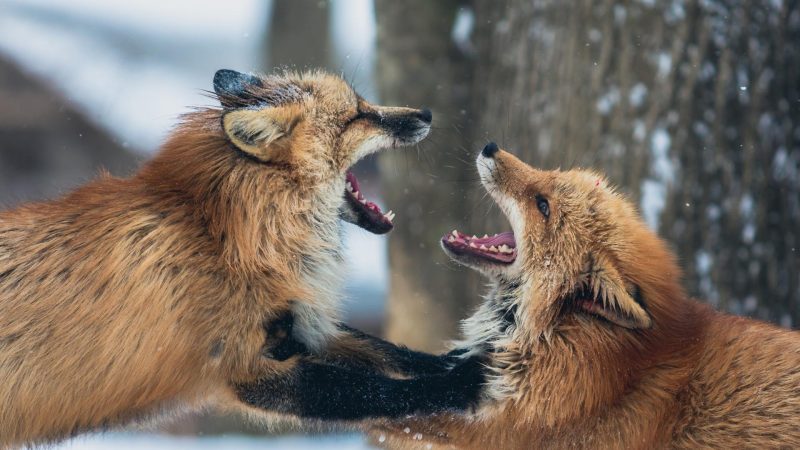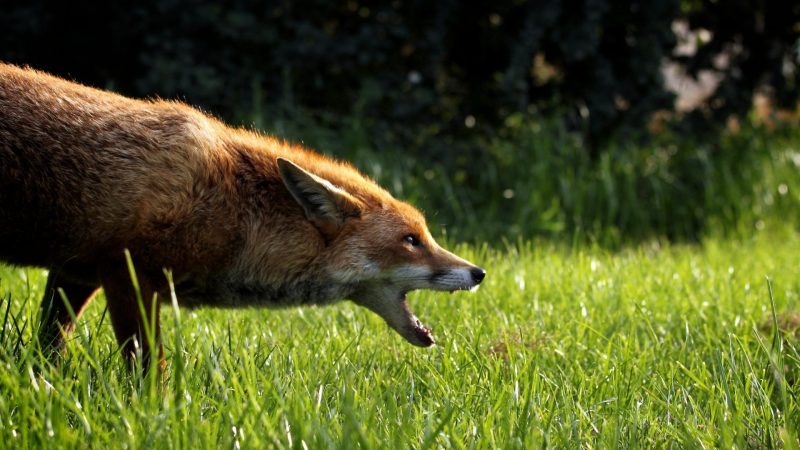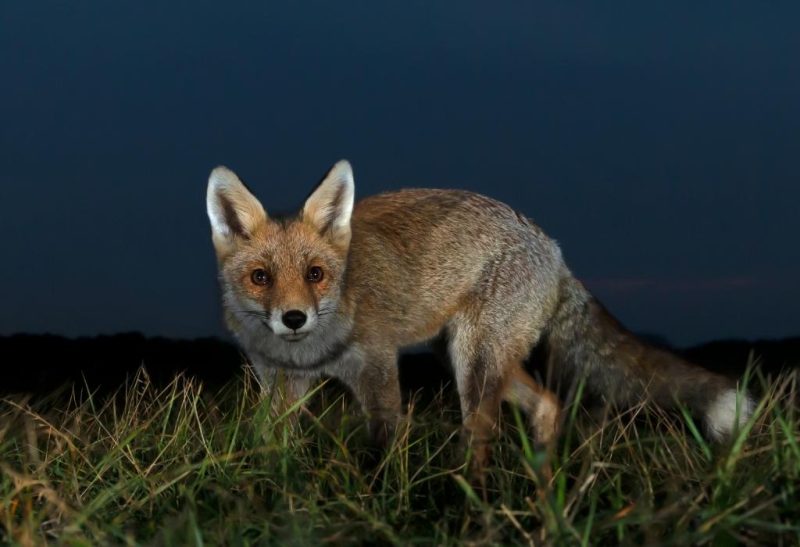You may be bothered when you hear foxes screaming at night. This occurrence may have given you creeps or sparked curiosity. As a human, you can’t understand the message of the scream, so it’s normal to wonder about it.
Why do foxes scream at night? Since this act is their way to communicate, there are several meanings behind it like:
- Foxes call the prospects that they can mate with during the mating season, which usually starts in January.
- They scream to fend off other foxes.
Foxes are nocturnal beings, so they scream at night. The scream is high-pitched, monosyllabic, and husky.
It’s done in a series that stops and starts again within three to ten-second intervals. You don’t need to guess the manifestation of this action or feel the creeps as some horror movies feature a fox’s scream.
It’s just their way to communicate with each other. So, just relax when you hear it on cold winter nights.
Aside from screams, do foxes make other kinds of sounds? You may want to know more about it. Don’t worry as this article is made to provide the answers to the questions that you have in mind.
Table of Contents
What Does a Fox Sound Like?

A fox sounds like a woman in distress, and it’s disturbing at night. It also seems that something is in pain or ready to attack.
Some people have even called the police thinking that someone is in distress. None of these is correct, as foxes make sounds for communication. Moreover, the yips and barks that they make are sometimes mistaken for neighborhood dogs.
Why Do Foxes Scream at Night?

Foxes scream at night to find a mate or when mating. Hence, a scream is a ‘love call’ for foxes. In this case, vixens are always the ones that scream to lure or find a mate.
They also do it when they’re in the process of mating that lasts for 20 minutes or more. When a pair is engaged in this activity, they both scream.
They also do it to warn other foxes of predators and danger. In this situation, the scream is from the male foxes as a sign of their claim to their territories, and other animals should back off.
Related: Fox Mating Habits and Behavior | Information and Facts
Do Foxes Ever Scream During the Day?
Foxes are nocturnal, so they are active at night. Thus, you can hear their screams at night and not during the day. You won’t see them around daytime either.
What the Screams Mean?

To Attract a Mate
Female foxes scream to lure mates during the mating season, and the peak is in January. It happens in winter with the absence of vegetation, so the sound can be heard even from a distance.
But both females and males scream when they are entwined in the mating process.
Foxes Scream to Communicate
Foxes communicate through screaming, and they use it to tell other foxes of incoming danger or predators.
When Frightened or Shocked
A scream is a way of foxes to repel rivals and predators such as coyotes and wolves.
Used as a Territorial Warning
Foxes are territorial, so the male ones scream to assert their right on their territory. They don’t like sharing their turf with other foxes.
Both males and females do it when they are being protective of their cubs from invaders. If the invaders are relentless, the male fox will attack.
What Noises Do Foxes Make?
Foxes don’t only scream or howl. But they sound like a mixture of dog and cat. Although there’s not much variation, they can create various sounds that are being described below.
Scream or High-Pitched Howl
This is used by foxes to call their mates during mating season.
Raspy Bark
Foxes do raspy barking to identify themselves and communicate with others.
But Nick Newton-Fisher, together with his research team, found more information about fox vocalization. They found 20 types of calls wherein eight of them are delivered by the cubs. These calls are divided into three main types:
1. Contact Call
A contact call of foxes sounds like ‘wow-wow’ or similar to a dog’s bark. But foxes produce a higher pitch than dogs because they’re smaller.
So, some people think that the contact call is from a hooting owl. It can be heard when two foxes meet. When they are close to each other, they make a clucking sound like chickens.
2. Interaction Call
An interaction call can vary since it’s based on the level of aggression and social status of foxes. For example, a fox obedient to its superior makes a high-pitched whine when greeting the one with a higher rank.
Gekkering is also practiced by adult foxes in aggressive encounters and cubs when playing. Chattering or rattling sounds are made in these situations.
3. Alarm Call
Parents usually make the alarm call, which is their way of telling their babies of danger and the need to hide in their dens.
An alarm call is like a cough when up close or a long ‘waahhh’ sound from a distance.
The ‘vixen scream’ or an eerie sound with marks of anguish during mating season is under this category. Generally, this is referred to as the sound given by females, but it can also be heard from males when mating.
What Other Noises Do Foxes Make?
Aside from screams that belong to an alarm call, contact call, and interaction call, there are other noises that foxes make.
During mating season, competitions among male foxes can happen. So, one makes a low, throaty growl to warn another to stay away from the vixen.
A female fox yelps and snarls at a male if she’s not prepared for breeding. The male recognizes and respects it, but he’ll stay until the vixen is ready. When the mating season comes, screams are heard.
When there are cubs in their dens, both parents release quick screams to tell others that they’re off-limits from their home range.
Where Will You Hear Foxes?

Red and gray foxes reside on farms, forested areas, and residential neighborhoods throughout the US. They sometimes hunt properties for carrions, worms, birds, frogs, rabbits, and rodents.
It’s alarming to have them around, especially when you have chickens, ducks, rabbits, and other pets.
Foxes have a reputation as stealthy as they sneak around private properties to search for food. They still pose danger even though they are nocturnal and rarely interact with humans.
The chances are high during summer, as they leave the ground to be more comfortable. The hideout that they choose is typically the dense areas like piles of rubbish or bramble patches.
Do Baby Foxes Scream?
Baby foxes don’t scream, but they make other sounds. Newborn baby foxes give off whelping sounds with additional rhythm when they’re around three-week-old.
They make sounds when they are isolated or need attention. When they’re lonely, they make a warbling sound as well.
When they’re a month old, they start to hiss and spit for defense or threatening. At this point, they learn the ‘gekkering’ made by adult foxes.
This sound is usually heard when they’re playing with each other. When baby foxes are around 19-week old, they come out of their dens and are capable of producing a series of infantile barks.
How Do You Stop Foxes From Screaming?
Since screaming is a social interaction of foxes, you can still hear them as long as they stay in your neighborhood. It means that you can’t avoid hearing the screams even if they refrain from visiting your garden or yard.
You can’t stop foxes from screaming, but you can chase them away to minimize the noise. Several fox repellents are available in the market, and here are the popular ones:
1. Contect Scarecrow Outdoor Animal Deterrent is an ideal tool as it releases a sudden burst of water to startle and make the intruder dash.
2. Another effective fox repellent is ZOVENCHI Ultrasonic Animal Pest Repellent. It emits waves in a frequency that is only audible to animals.
You can let it stay outdoors as it has a solar panel to gain energy from the sun.
Summary
There are several reasons why foxes scream at night. It’s disturbing and unpleasant for some people, but it’s inevitable since foxes do it to communicate with each other, especially in mating season.
Vixens do it most of the time, but male ones also give off the sound when mating and making their territory.
List of Sources
Newton-Fisher, N. E., et al. (1993). Structure and Function of Red Fox Vulpes Vulpes Vocalisations. University of Kent.
What does the fox actually say? (2013). The University of Melbourne.
Varela, C. (2019). Communal living and screams in the night: The secret lives of foxes. Lancashire Manchester North Merseyside.
